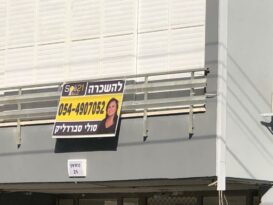In which areas are the rental yields high? How can I find a good tenant? Which expenses are the tenants expected to cover, and which are the responsibility of the landlord? How much is property tax? These are the questions that should be addressed when seeking to make a profitable return on your real estate investment. Buyitinisrael brings you a guide to maximizing the yields on your investment property in Israel.
In most Western countries the rental housing market is controlled by corporations. In Israel, however, the market relies almost exclusively on private individuals who have bought an apartment or two for investment purposes, in addition to their own homes. There are many financial considerations to take into account before purchasing a property with these intentions. Some buyers go for expensive property, while others prefer something more affordable. Many people opt for a new apartment, while others choose an apartment in an old building. All investors, have one thing in common, however: to make their money work and maximize the return on their investment (ROI).
Real estate investors are generally focused on either capital appreciation, rental yields, or a combination of the two. Capital growth may be required for retirement planning, assisting children, or to offset low returns on savings, whereas rental yields can be a way to supplement monthly income or to provide an income stream during retirement years. Where the rental yields are important, potential landlords will want to rent the property out as quickly as possible in a manner that will bring them the greatest ROI.
How to increase the rental yield
Rental yields signify the rate of return from an investment and show how viable a real estate investment decision is. The annual (gross) return on renting a property is calculated by taking the total rent received throughout the year divided by the current cost of the apartment. Until about a decade ago, yields from apartment rentals in Israel were quite high, especially for properties in the periphery. When renting out an apartment in Be’er Sheva, for example, it was possible to reach an annual return of 8-10%, while in the center of the country yields hovered around 4-5% per year.
However, the sharp increase in housing prices from 2008-2015 – at a rate of about 100% (in real terms) – led to a significant decline in yields. Now, annual returns from rental properties in the periphery range from 4-5%, with yields in cities in the center are dropping to 2.5-3.5%.
That being said, there are several ways that an apartment owner can increase the yield from a rental unit. First, buyers must be thorough and patient when looking for an investment property in order to find an apartment being sold for a low price in relation to the market price in that particular neighborhood or city. Of course, there is usually a good reason for a low asking price, but it will not necessarily affect how much a landlord can charge for rent each month.
For example, an apartment located in an old building with little chance of an urban renewal project being carried out in the near future has a much lower value than a comparable apartment in a building with a higher chance of renewal. However, this does not affect the amount of rent that a landlord can charge, because the apartment itself has the exact same value to the current tenant, regardless of the future fate of the building.
Another way to increase the yield is a surface remodeling of the property. As opposed to a serious renovation that includes replacing plumbing and electricity infrastructures, a basic remodeling intended to upgrade the appearance and design of the apartment does not cost very much, but allows the landlord to significantly increase the rent.
How to find good tenants in Israel
Perhaps the most important decision a landlord will make when renting out a property is to whom to hand over the keys. As the passive income seamlessly rolls in, a good tenant will make you forget that you rented out the property at all while a problematic one may keep you up at night – whether it is from repeated noise complaints from neighbors, grievances from the building committee (va’ad habayit) about the mess, or misconduct in common areas, or the worst-case scenario, not paying rent.
In order to avoid such scenarios, it is very important to do a basic background check on potential tenants. First things first have a simple conversation with the person in order to understand who he is, what he does for a living, whether or not he has a family, how much he earns per month (it is common to ask for the last three payslips), where he lived before, and for how long he intends to live in the apartment. You can also ask for the phone number of his previous landlord in order to verify that he is a reliable, responsible tenant before signing a contract.
Which expenses are covered by the tenants?
Aside from an initial renovation, which can cost several tens of thousands of shekels, a landlord can expect regular expenses that have to do with routine maintenance, such as repairing leaks, fixing electric problems, replacing the water boiler, etc. Naturally, an old apartment with outdated infrastructure will have a higher maintenance cost than a property built more recently.
Tenant turnover is an additional cost to take into account which will ultimately affect the rental yield. While a standard lease requires the tenant to leave the apartment in good condition – clean and whitewashed – a high turnover of tenants almost always incurs additional expenses for the landlord, as each new tenant will have his own requests about what issues in the apartment need to be fixed or changed. Therefore, constant tenant turnover increases expenses for the apartment owner, lowering the overall ROI in Israel.
Another expense associated with tenant turnover is real estate brokerage costs. The standard fee for brokerage services is one month’s rent plus VAT (which currently stands at 17%). However, the question of whether the tenant or landlord must pay the agent fee depends on the power relations between the parties in the specific market where the property is being rented.
In areas where the demand for rentals is high, such as Tel Aviv, the landlord will try to roll over the fee to the tenant – even if the landlord is the one who hired the Israel real estate agents. In peripheral areas or markets with high apartment supply, like Harish or Ashkelon, the landlords are generally responsible for paying the brokerage fees.
Property taxes (arnona) and utilities (electricity and water) are generally be paid by the tenants, as well as the monthly payment to the building committee (va’ad habayit). However, in the event of significant repairs to the building or infrastructure upgrades, such as replacing mailboxes, installing cameras, or roof repairs, the cost falls on the apartment owners in Israel which can severely impact the ROI.
How to write a rental contract
While landlords can hire a lawyer to write a rental contract, most do not bother to do so, because a standard lease can be easily downloaded for free online.
In the past, standard rental contracts gave a lot of power to landlords, especially in central Israel, where the high demand for apartments forced tenants to agree to particularly unbalanced contracts. For example, many agreements included clauses in which the tenant had to provide the landlord with hefty guarantees and/or collateral, prepare for the possibility of eviction at short notice, and accept a potential increase in rent each year.
Following the Social Justice Protests of 2011, which erupted largely due to the difficult situation of tenants, the Knesset tried to pass a Fair Rent Law, which included many sections designed to protect the rights of tenants. While this law was not ultimately approved, it raised awareness of the issues in the market and introduced the principles of Fair Rent to standard, off-the-shelf agreements. Today, many rental contracts are for a long-term lease of at least three years, during which the landlord cannot significantly increase the rent.
Although a landlord is not obligated to use such a contract, there are two good reasons to do so. First of all, in such a competitive environment, tenants will see a contract that protects their rights as a significant advantage. This will generate greater demand for the apartment, and the owner will have more choice in tenants. In addition, in the not-so-simple housing reality that has prevailed in Israel for many years, many would argue that this is the ethical way of renting out an apartment and improving the standards of the market.
How to calculate taxation on ROI in Israel
In Israel, apartment owners are exempt from paying tax on income from rent up to NIS 5,070 per month. The exemption applies regardless of whether the rental income is from one or multiple apartments. Landlords must pay partial tax on rental income of NIS 5,070-10,140. Rental yields are not calculated for the purpose of this tax.
Those with monthly incomes significantly above NIS 5,070 can choose a reduced tax plan in which they will pay 10% tax on all their rental income, but without the possibility of deducting expenses they have spent on maintaining the property.
According to the position of the Israel Tax Authority, anyone who owns more than 10 rental apartments is considered to operate an apartment rental business and will be taxed in income tax for all ROI. Among those holding 6 to 10 apartments, the Tax Authority will examine each case individually. Either way, for those whose rental income reaches tens of thousands of shekels each month, a achieving high rate of ROI, it is recommended to receive tax advice. (Capital Gains Tax levied on ROI through capital growth in Israel is a whole different story, which is beyond the scope of this article.)







